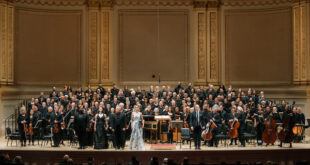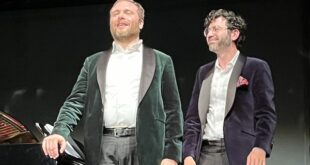
Tuesday night at the Church of Saint Mary the Virgin, shielded from the touristy hubbub of Times Square just outside, a chamber-sized version of the American Classical Orchestra and Chorus presented an unusual and setting-appropriate concert. The program included music of Handel and Torelli, a sublime performance of Allegri’s Miserere Mei Deus by the chorus, and Antonio Caldara’s rarely-heard oratorio Maddalena ai piedi di Cristo in its entirety. That last, long-lasting work featured the gifted Czech soprano Hana Blažiková in the title role.
It was via a YouTube video of Blažiková singing an aria from Maddalena that ACO director Thomas Crawford first came upon the oratorio, composed in about 1700. According to his program notes, it doesn’t even exist in published form, but after some effort and with the help of two musical scholars, Crawford obtained a score, then scored again by enticing Blažiková to come to New York and sing the title role with the ACO.
Scored for orchestra and soloists only, and structured opera-like, with recitatives alternating with arias, Maddalena is an oratorio unlike the familiar chorus-centered ones by the likes of Mendelssohn and Handel.
It tells of the struggle between Earthly Love and Celestial Love, personified as in a morality play, for the soul of Mary Magdalene. Christ, a Pharisee, and Mary’s virtuous sister Martha also appear.
The music is programmatic at times, gently rocking like a lullaby when Earthly Love sings of sleep and happy dreams, bubbling with fast, low triplets when Celestial Love laughs at the “glories” of worldly pleasures. Caldara spins a remarkable variety of moods and themes, from Maddalena’s dark song of supplication as she looses her “golden locks” and leaves vanity and “worthless finery” behind, to Martha’s stark, eerie melody as she recognizes the “felicitous tears/Of a truly afflicted heart!”
The soloists skillfully put all this across with precise enunciation and lovely style, although when dipping into the alto register the female voices did get a bit lost amid the instruments and the church’s echoes. Marcy Richardson displayed a shining timbre as Martha. Tenor Martin Coyle was in glorious voice as Christ. Rich-voiced baritone Christopher Dylan Herbert as the Pharisee seemed born to sing in Italian. And Solange Merdinian and Abigil Fischer did yeoman’s work in the busy and complex roles of Earthly and Celestial Love respectively.
Blažiková was the shining light at the center. Somehow unaffected by the church’s acoustics, she owned the role. She seemed to live Mary Magdalene’s pain. Watching her expression and posture added a whole dimension to the performance, even beyond her silvery singing. She made it seem effortless.

Maddalena is something of a marathon. A small but not insignificant number of audience members left before it was over. The small orchestra suffered a few tuning problems in the late going, with little or no opportunity to tune their finicky period instruments.
But all the performers deserve plaudits for maintaining full energy and focus throughout the Maddalena. In contrast, I suspect the first and shorter “half” of the concert may have felt like a breeze, with Handel’s glorious Chandos Anthem No. 10 making a straightforward enough start. Tenor Michael Jones sang the melismas on “all the days of my life” in tones like liquid light. In “I will offer in his dwelling,” the chorus, though small in number, projected a big echoey sound, the music surely recognizably Handel-like even to a hypothetical casual listener who knew only Messiah.
At moments the music actually benefitted from the church’s booming reverb, conceptually, as when Jones sang “And to behold the fair beauty of the Lord,/And to visit his temple,” and sonically too, as when, after the chorus asked “For who is God but the Lord?/Or who hath any strength except the Lord?”, the sound tapered off in a dramatic decrescendo long after all mouths were closed. The music rolled fast, like the waves, as soprano Lianne Coble sang “It is the Lord that ruleth the sea,” and the chorus displayed its perfect balance in the beautiful and stately final section, which to my mind just doesn’t go on long enough.
The singers and woodwinds then took a breather as the orchestra backed up baroque trumpeter John Thiessen in an exquisite performance of Giuseppe Torelli’s Concerto for Trumpet and Strings and D Major, composed about 1690. Thiessen’s crystal-clear tone piped through well enough, though placing him in front of the orchestra would have made for a better balance in the echoey church. It’s remarkable how few instruments, period or not, can make a big full sound in such a space.
With four of the singers up in the balcony behind the audience, the chorus took their places again for what is surely one of the most beautiful choral works ever written, Allegri’s Miserere Mei Deus, which alternates brief passages of Gregorian chant with Renaissance polyphony. The big church was the perfect setting, the divided chorus a brilliant idea. The result: the music brought tears to my eyes.
[amazon template=iframe image&asin=B005A53RYG][amazon template=iframe image&asin=B00MW5BE42][amazon template=iframe image&asin=B003LKRN6U][amazon template=iframe image&asin=B005DNE4JC][amazon template=iframe image&asin=0486452654] Blogcritics The critical lens on today's culture & entertainment
Blogcritics The critical lens on today's culture & entertainment



